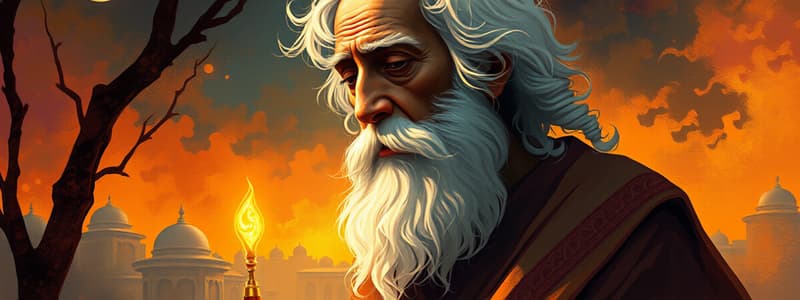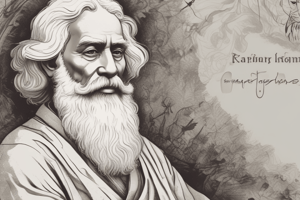Podcast
Questions and Answers
Who is Rabindranath Tagore?
Who is Rabindranath Tagore?
A humanist, poet, novelist, playwright, painter, and essayist from Bengal.
Which poetic volume won Tagore the Nobel Prize?
Which poetic volume won Tagore the Nobel Prize?
Gitanjali
What was the main theme of Tagore's 1907 essay 'World Literature'?
What was the main theme of Tagore's 1907 essay 'World Literature'?
The quest for the eternal and universal man in literature.
What university did Tagore found?
What university did Tagore found?
Tagore promoted narrow-minded nationalism.
Tagore promoted narrow-minded nationalism.
What kind of bonds does Tagore describe in relation to truth?
What kind of bonds does Tagore describe in relation to truth?
What does the bond of joy represent according to Tagore?
What does the bond of joy represent according to Tagore?
Tagore saw the British regime in India as a __________ of social disease.
Tagore saw the British regime in India as a __________ of social disease.
Who invented the term 'comparative literature'?
Who invented the term 'comparative literature'?
In what year did Hutcheson Macaulay Posnett publish 'Comparative Literature'?
In what year did Hutcheson Macaulay Posnett publish 'Comparative Literature'?
Hutcheson Macaulay Posnett was born in Dublin.
Hutcheson Macaulay Posnett was born in Dublin.
What does Posnett's evolutionary theory of literary production encompass?
What does Posnett's evolutionary theory of literary production encompass?
Posnett describes world literature as arising in _____ settings such as the Hellenistic world.
Posnett describes world literature as arising in _____ settings such as the Hellenistic world.
Posnett's book was published in which series?
Posnett's book was published in which series?
What fundamental facts does Posnett highlight in literary evolution?
What fundamental facts does Posnett highlight in literary evolution?
According to Posnett, world literature is solely based on local cultural constraints.
According to Posnett, world literature is solely based on local cultural constraints.
Study Notes
Rabindranath Tagore: Overview
-
- Born in 1861, Rabindranath Tagore emerged as a prominent figure in Bengali literature, evolving into a versatile poet, novelist, playwright, painter, and essayist whose works would influence the course of modern literature profoundly. His multifaceted talents enabled him to address human experiences and emotions through various artistic forms, making him a key player in the realm of contemporary art and literature.
- Achieved international fame with Gitanjali (1912), a collection of poems that resonated deeply with both Indian and global audiences, ultimately earning him the prestigious Nobel Prize in Literature in 1913. This recognition marked a significant turning point not only in his career but also in the perception of Indian literature worldwide, showcasing its depth and universality.
- Advocated for India's cultural and political independence from British colonial rule, Tagore became a leading voice of the Bengali Renaissance, which invigorated a resurgence in Bengali culture and pride during a time of political upheaval. His activism placed him at the forefront of movements aimed at revitalizing Indian identity and self-expression.
Contributions to Literature and Education
- Translations of Tagore's work into several languages, including English, Dutch, German, and Spanish, facilitated his recognition in Europe and the United States, allowing a broader audience to engage with his themes of beauty, love, and humanism. This accessibility played a pivotal role in the global appreciation of Indian literature, as Tagore’s writings were introduced to literary circles that were previously unaware of the richness of Bengali culture.
- His novel The Home and the World (Ghare-Baire, 1919), celebrated alongside Gitanjali for its literary merit, explores complex themes of nationalism and the conflict between tradition and modernity. This work further solidified Tagore's reputation as a novelist who could capture the intricacies of human relationships against the backdrop of sociopolitical issues.
- Founded Visva-Bharati University in 1921, with the intention of creating an institution that emphasized a blend of Indian and global cultures, Tagore dedicated much of his life to this educational venture, envisioning it as a space where art, education, and culture could coexist harmoniously. His focus on a curriculum that integrated diverse subjects reflected his belief in the importance of a holistic approach to education, countering the rigid, colonial educational structures of the time.
Philosophy of World Literature
- In his 1907 essay World Literature, Tagore articulates literature’s purpose as embodying the search for "the eternal and universal man," a concept reflecting his belief in the transcendent nature of literature that goes beyond geographical and cultural boundaries. He encourages readers and writers to seek common humanity in their work, connecting deeply with universal themes that resonate across cultures.
- Inspired by Goethe's concept of Weltliteratur, he aimed to transcend nationalism while opposing British imperialist strategies in India, recognizing the danger of singular nationalistic narratives. Tagore's holistic perspective urged people to appreciate cultural diversity as a means of fostering global unity and understanding.
- Advocates for the hospitality of foreign ideas, asserting that nations should support one another culturally for mutual enrichment, Tagore believed in the transformative power of cultural exchange and how it could lead to a greater appreciation of diversity while fostering peace and cooperation among different peoples.
Bonds with Truth
- Tagore identifies three types of bonds humans have with truth: reason, necessity, and joy, categorizing these relationships as fundamental aspects of human experience that shape one's understanding of reality. Each bond represents a different approach to truth and knowledge, highlighting the multifaceted nature of human interactions and beliefs.
- Bond of Reason: This bond is characterized by a competitive relationship with truth, where individuals engage in a relentless pursuit of knowledge, similar to a hunter and prey dynamic. This relationship often leads to a self-conceited chase for understanding, where the quest for reason can overshadow the inherent beauty of simply being present with the truth.
- Bond of Necessity: Described as a results-driven connection vital for survival and advantage, this bond fosters a transactional relationship with truth. Here,
ding.
Hutcheson Macaulay Posnett
- Born in Dublin in 1855, he was a barrister before shifting focus to literature.
- Authored "Comparative Literature" in 1886, claiming to coin the term "comparative literature" in English.
- Took a professorship in Classics and English at the University of Auckland, New Zealand.
Evolutionary Theory of Literature
- Posnett proposed an evolutionary theory encompassing a broad spectrum of literatures: Western European, Greek, Roman, Arabic, Hebrew, Sanskrit, Persian, Chinese, Japanese, Russian, and Eastern European.
- Influenced by Herbert Spencer's theories on economics and politics, and Charles Darwin's ideas on societal evolution.
- Presented world literature as part of the evolutionary journey from tribes to modern nations.
Concept of World Literature
- Departs from Goethe's ideal of Weltliteratur; views world literature as a current phase in literary evolution rather than a future goal.
- Identified imperial settings, such as the Hellenistic world, as origins of world literature.
- Suggested that world literature has potential for universality while also recognizing losses in organic ties to specific communities.
Literature and Social Structure
- Argues that literature evolves alongside the expansion of social groups from clan and city to larger societal structures.
- The Hebrew clan's communal conceptions and Greek centralism illustrate literature's initial development linked to localized experiences.
- As communities expand, so does the ideal of human unity, leading to religious and political cosmopolitanism.
Characteristics of World Literature
- Key feature is the detachment of literature from specific social groups, promoting universalization.
- Observed in various literatures, including Alexandrian, Roman, later Hebrew and Arab, Indian, and Chinese.
- Universalism emerges in both Eastern and Western literary traditions, albeit manifesting different understandings of personality.
Contributions to Literary Debate
- Posnett's work laid foundational concepts for ongoing discussions around world-systems theory and literary evolution.
- His explorations on literature's global audience remain relevant over a century later.
Studying That Suits You
Use AI to generate personalized quizzes and flashcards to suit your learning preferences.
Description
Explore the life and contributions of Rabindranath Tagore, a towering figure in Bengali literature. This quiz covers his literary achievements, philosophy, and impact on education and culture, including his famous works like Gitanjali and The Home and the World. Dive into the essence of Tagore's advocacy for India's independence and his vision for world literature.




